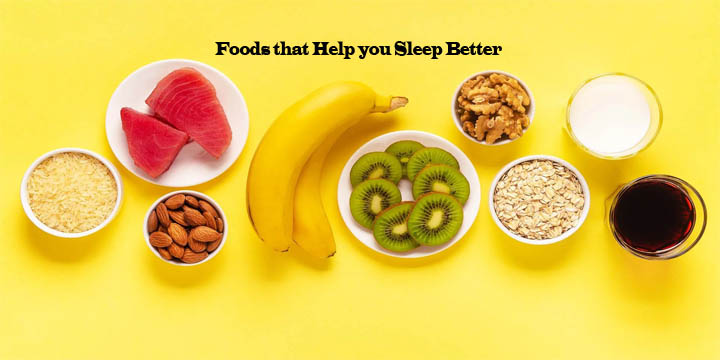Foods that Help you Sleep Better
Sleep as we all know is a very vital activity the body needs to function properly. Getting the best sleep can be an uneasy task sometimes. People apply various tricks and take various sleeping supplements like melatonin to make sure that this vital part of our daily activity is done.

According to various nutrition scientists, what we eat can certainly affect our sleep, so it is very important to watch our nutrition to make sure that we get the best sleep at the end of the day.
A Balanced Diet is Important for Sound Sleep
Eating balanced foods will help manage blood sugar and reduce inflammation which is important in preventing pain and getting sound sleep says Josh Axe, a clinical nutritionist and co-founder of Ancient Nutrition.
“Getting enough macronutrients (carbs, fats and protein) also assists your body in creating calming chemicals like serotonin and melatonin, which help you feel relaxed and sleepy.”
Some certain foods can improve your sleep when you eat them before going to bed or when you wake up in the middle of the night, but the foods given below will help you sleep better even if you take them at any time of the day.
No one food is a sleeping pill. The best key to eating well for good sleep is to take a mindful balanced diet overall.
Nutrients that are very Vital for Sleep
“Eat a variety of unprocessed, whole foods that are high in antioxidants and fibre. Try to combine foods that provide different macronutrients (carbs, fats and protein), which ensures you’re meeting your nutrient needs,” says Axe.
He also adds that it’s a good idea to stop eating 2 to 3 hours before bed so you have time to digest your food before going to sleep and don’t run into issues with acid reflux.
Outside of the macronutrients, Axe says some micronutrients can affect sleep as well. So if you suspect you’re deficient in something, you should ask your doctor to run labs to know more.
“It’s possible that a vitamin D or magnesium deficiency can interrupt sleep. Some evidence also shows that people low in vitamins E and C, and B12 and B6 might also suffer from more sleep problems,” says Axe.
“Each of these nutrients affects sleep cycles in a different way, such as by playing a role in your circadian rhythm and body’s ability to produce melatonin and other calming chemicals.”
Foods that help you Sleep Better
Remember, no food, in particular, is a sleeping pill. Sleep-promoting foods include those that contain tryptophan (an amino acid that helps with the release of serotonin), magnesium, vitamin D and complex carbs,” says Axe. “Foods high in vitamin C and B vitamins can also be helpful.
As chosen by Axe, these are the top seven sleep-promoting foods.
- Milk and yoghurts
- Whole grains like oats or quinoa
- Animal proteins like poultry and fish
- Leafy greens and cruciferous veggies
- Nuts like Almond and cashews
- Bananas, Kiwi, berries and other fruits
- Free-range eggs



